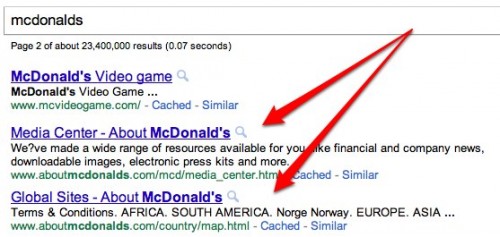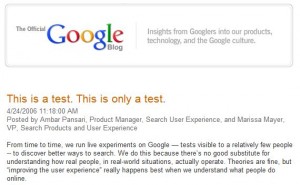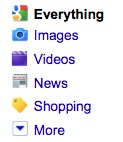25 Things I Hate About Google, Revisited 5 Years Later
Five years ago, I wrote a story called “25 Things I Hate About Google.” It went viral, to my surprise. I thought it was worth revisiting that story on its five year anniversary, to see how many of those “hates” have been fixed. So let’s dive in! It’s actually been five years and a week […]
 Five years ago, I wrote a story called “25 Things I Hate About Google.” It went viral, to my surprise. I thought it was worth revisiting that story on its five year anniversary, to see how many of those “hates” have been fixed. So let’s dive in!
Five years ago, I wrote a story called “25 Things I Hate About Google.” It went viral, to my surprise. I thought it was worth revisiting that story on its five year anniversary, to see how many of those “hates” have been fixed. So let’s dive in!
It’s actually been five years and a week since my original story, which was written on March 13, 2006. I’d meant to get this finished for the exact anniversary, but it took longer than I expected.
For those who might feel I’m full of Google hate — I’m not. I admire much of what the company does, and my original piece — as well as this follow-up story — are written from the perspective of hoping the company will improve, not to pull it down. Smart Googlers know that my list might be useful feedback to consider, as long-time Googler Matt Cutts has written. Twice.
Matt himself has been nagging me over the years to do an update to my original list, so Matt, this one’s especially for you.
In my story below, I’ll provide what I originally wrote and how the situation looks today. Each section will begin “Hate” if things haven’t changed, “Love” or “Like” if there’s been a fix, and there are some “Mixed” and “N/A” along the way. The overall scorecard is at the end.
#1
HATE: Web Search Counts That Make No Sense
“Why do search engines lie?” has Robert Scoble recently poking at this, on how the reported counts don’t always match reality….
Mars landing sites gives 1,050,000 matches while mars landing sites earth gives nearly double that amount, 1,840,000 listings. It shouldn’t. Adding that extra word should give you a subset of the original query. It should come back with less results, not more….
If you are going to put out a number, perhaps it should be accurate?
Now:
The issue continues, and it doesn’t seem likely to be solved any time soon, if ever. A search for dvds, for example, brings up 179 million pages. But that same search without any pages that have the word “rentals” on them? It brings back 289 million — MORE pages!
Why Google Can’t Count Results Properly is my article from last October that takes a fresh look at the issue and why incorrect counts can even cause Google political trouble. My conclusion from that:
I love data, but it should be accurate data — and these numbers are anything but. Time to retire them, Google. Or after at least five years of the “it’s not our highest priority” mantra, finally make it a priority.
#2
HATE: Google Keeps Serving Up Sites You’ve Seen
Then:
You may not know the name “results clustering,” but you recognize Google doing it. That’s when it sees there’s more than one page from a web site that might match what you are looking for, so it “indents” the second best one below the first. Search for books, and you’ll see this happening with Amazon.
But clustering only happens on a results page-by-results page basis. In other words, look at mars landing sites, and there’s a link to a page at the msss.com domain near the bottom. Say you reject this. Go to the next page, and msss.com is back again, as is the BBC.
If I rejected content from these sites the first time, I want to see something new … Give me the best page from a domain once, then give me some variety, not these second chances.
Now:
If anything, the situation is worse. Last year in August, Google announced that it would allow more results from the same web site to dominate the top search results. Then a few months later, Google further expanded this behavior. The articles below have more about these changes:
- Official: Google Now Lets One Domain Dominate Search Results
- Google Showing More Results Per Domain For More Queries
This is great for brand owners and marketers. For example, a search on “google” at Google brings up nothing from any non-Google web sites, some of which may have anti-Google messages. Similarly, searches for “mcdonalds” and “bp” are clean, dominated by the content produced by those corporations.
That’s not great, in my view, for the searcher seeking some variety in their search results. I still also think it makes no sense. Imagine I search for mcdonalds and bypass all of this official McDonald’s information on the first page of results (this is what I saw on March 13, from Austin, Texas – others may see slight differences):
- 4 listings from mcdonalds.com
- 3 listings of actual McDonald’s restaurants near me
- 3 listings from the McDonald’s-run listings from aboutmcdonalds.com, mcstate.com and happymeals.com
If I’ve rejected all that official information, then why on earth do I want even more official McDonald’s info showing up again on the second page of the results:
Similarly, how is listing so many official pages for the SXSW conference really helping, when one of them is for the 2007 event and three others were already listed in the “sitelinks” that appeared below the main listing (Again, this is what I saw last week in Austin. Others may see slightly different results):
Meanwhile, the music event — also in the sitelinks — gets shoved into the second page of the results. There’s no logic there. No attempt to produce order. It’s like you’ve vomited a bunch of results all over the page.
I know why you do this, Google. It’s cheap. It’s much cheaper to assess what you’re listing for the first page of results independently of all the other pages, especially when few searchers drill deep into those other pages. But how about assessing everything you show for the first two or three pages of results and giving more variety?
#3
LIKE: Less User Interface Confusion
Stop confusing people. Pick a user interface and go with it! Google keeps testing and testing various UIs.
If I had the time and energy, I’d take all the screenshots people have posted and put them into a single “Google of the future” page. Then again, they probably wouldn’t commit.
Enough with the testing! Decide on something and go with it, then change it later if you need to. This constant UI testing over the past year has had people wondering if they’ve been hit by adware/spyware….
At least if you’re going to test … tell the small number of people who care this, to save us from a billion people having to blog about the “discovery” of something new.
Now:
Google still does plenty of testing. And we still get messages from people who wonder if they’ve been hit by malware. But it feels like this is happening less. Ideally, the company would regularly advise people of when a test is underway. No, I don’t agree that it would screw up the testing data, which has been Google’s typical objection to posting publicly about test.
Somewhat related, a I love the facelift Google got last year with its “three pane” interface. Things feel much more organized. For more about that, see:
One last thought. Google’s biggest, most important, most profitable and original product was search. Maybe Google Search deserves its own blog, like many other products have? That would make it easier to post tidbits of interest about search changes that don’t quite require telling the world through its main blog.
#4
LOVE: Related Searches Everywhere
Then:
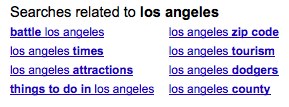
Fair enough, but query refinement is important. It can help people, and Google remains oddly lacking in not having it. It pops up as part of the UI tests. Get it out there….
Now:
I’m surrounded by places where you suggest searches, from right within the search box through Google Instant, to along the left-side of the page via Google Search Options, to the bottom and top of search results — and even via Wonder Wheel. Thanks!
#5
LOVE: Easier Access To All Your Tools
Give easier access to all your tools. Life at Google is more than web, images, groups, news, Froogle and local. Maybe I want to switch to mobile search, book search, catalog search or yes yes yes blog search with an easy click from the existing query I’ve done. I can’t. I can’t even if I use your toolbar. Many of these services remain in “visit directly” mode….
Now:
The aforementioned search options column makes this much easier. Thank you!
#6
LIKE: Country-Specific Results On Google.com
Make Google.com show the same results regardless of country. You have country-specific editions. They give people the option to choose if they want a country skew. Given this, don’t automatically skew anyway if someone has chosen to search the entire web. It’s confusing when different people in different countries are comparing results….
Now:
Since Google.com now produces different results within the US, where even the city you’re in can have an impact, I give up on this battle. I also give up because I agree, localization makes sense. Plus, with personalized search results, the new normal is that there are no normal results.
#7
LOVE: RSS For Web Search
Then:
RSS feed for web search. OK, I know the results don’t change much, and I know that RSS feeds of web search that Yahoo and MSN offer are hardly winning over mass numbers of users. Still, why not? Since you offer RSS for news search results and other things, let me monitor web search the same way.
Now:
Google Alerts gained an RSS feed option since my original post. Thanks!
#8
LOVE: Support For NOODP
Then:

Now:
You’ve since added support for the NOOPD meta tag. Thanks! Now how about support for a new “YES I REALLY WANT YOU TO USE MY HTML TITLE TAG” tag? Because I’m really tired (and I’m not alone) with you unilaterally deciding what’s the best title for my web pages in your results. More about this, below:
#9
HATE: You Cache Pages
Then:
Stop caching pages: I was all for opt-out with cached pages until a court gave you far more right to reprint anything than anyone could have expected. Now you’ve got to make it opt-in. You helped create the caching mess by just assuming it was legal to reprint web pages online without asking, using opt-out as your cover. Now you’ve had that backed up legally, but that doesn’t make it less evil.
Now:
No change. I still think you should do it. My longer argument from 2006 after my “25 Things” post is here.
#10
HATE: No Guaranteed Web Search Support
Then:

Now:
It’s like nothing has changed [Postscript: Nothing’s changed on Matt’s blog, in terms of people who flock there for support despite the huge amounts of support Google offers elsewhere]. Sure, a paid support option might put you under fire that you might be making algorithm updates like Farmer / Panda just to generate support revenue. But others might appreciate a guaranteed route.
If not paid, maybe you could give anyone who registers with Google Webmaster Central one or two free guaranteed express support tickets, so that we don’t have bloggers talking about getting in contact with Google being a “crap shoot” and diminishing the huge amount of resources you do put in to support through Google Webmaster Central.
#11
HATE: No Pick & Choose For Search Advertisers
Then:
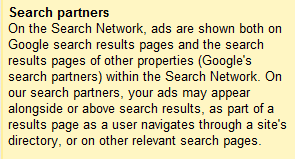
OK, now you’ve done good by giving them choice. Let them also decide if they want to pick-and-choose in the search ads space, as well.
Now:
Unless I’m missing it, it’s still a case that you cannot pick-and-choose which search partners to have ads appear on. You either exclude all of your search network outside of Google, or you have to to take all of it. Why not allow more choices?
#12
LIKE: More Responsive To Click Fraud Complaints
Then:
Be more responsive to click fraud complaints: I’ve heard from too many advertisers who have felt over the years like they’re making something up when they come forth with click fraud concerns. You’re promising to do better. Please deliver. Make them feel supported. Work with the third parties. Help them help you be successful, not sued again.
Now:
It seems like you’ve had only one lawsuit related to click fraud since settling the class action suit back in 2006 — and this 2010 case seems tiny. Click fraud isn’t something I hear many advertisers worrying about these days, either from talking with them or reading through news reports. Sounds like you are being more responsive.
#13
HATE: AdWords & AdSense Confusion
Make AdWords once again a program that links ads to keywords for advertisers and publishers; AdSense a program that contextually places ads and DomainSense a program that puts ads on parked domains. Having AdWords as the program that puts ads into Adsense For Search/Content/Domains is confusing….
Now:
The situation hasn’t changed. I can’t say that the confusion seems to be harming Google in any way, and perhaps it would be even more confusing to change now. But then again, these days, we have things like “AdSense For Error Pages.” It still feels kind of crazy.
#14
HATE: Search Revenues Aren’t Broken Out
Break out search revenues from other types of ad revenues. We can’t know the state of health for actual search advertising — advertising where an ad appears if someone’s actually entered a search term — if it’s lumped in among your AdSense for content revenues….
It’ll hurt you down the line if one channel starts to weaken and the other remains healthy. Failure to breakout means that people will assume all of “search” is having trouble.
Now:
Quick, how much money does Google make from search? Whatever figure anyone tells you, it’s wrong. That’s because we still don’t know. Search revenues remain mixed in advertising overall. Google probably won’t change this, because even with the recent economic downturn, it still didn’t feel it had to break them out.
Nevertheless, if Google wants to avoid being classified incorrectly as a “one trick pony” that’s all about search ads, we need more guidance like we got about mobile and display revenue last year. What do you earn off of search versus other types of advertising? This will be especially important as Facebook’s “display” ads keep growing.
#15
HATE: Self-Serve AdSense
Then:
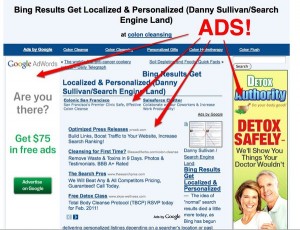
Is this what you want to fund? An economy where everyone and their brother and sister shoves up the same content, which you then index, which is essentially the same thing?
I know the self-serve program has helped you dominate the contextual space. But you fuel so much junk! Can’t you be more selective? Give more money to the people who are really working to produce information rather than just ad revenues.
Now:
It’s still an issue. Google fuels an incredible amount of garbage on the web. Google’s lately been reassuring that if a site is banned from Google’s search results, that takes out their AdSense account as well. But why do this after the fact? Why can’t you choose to spend more time figuring out who to reward with your program ahead of time?
Seriously, you have cars that drive themselves, you embarked on some giant project to figure out what makes a good boss, but you can’t figure out how not to accept scummy sites into your ad program?
Worse, it’s disingenious for your CEO Eric Schmidt to be complaining that the internet is full of garbage when his own company funds that (see The Google Sewage Factory, In Action: The Chocomize Story).
Finally, look at that “Category” illustration over there on the right. That’s from within Google AdSense. It’s a way that publishers can block certain types of ads.
See the fourth category down, “Get Rich Quick?” You’ve figured out a way to automatically identify ads that make these types of claims which, let’s face it, aren’t going to get anyone rich quick. But rather than block them entirely, or block them by default, you instead enable them by default to show across your entire AdSense network.
I think we know who is getting rich quick off those ads.
#16
N/A: Blogger Being Free
Then:

Charge people even a token amount ($1 even), and that will be a big barrier. Who’s going to ding you for charging a $1 start-up fee that you can levy through Google Payments? If you must give away for free, find a better, more trusted mechanism to partner with schools or others. Or make all Blogger blogs banned from being spidered for the first 30 days and open them up after that upon review.
If that’s not perfect, then figure something else out. But do something.
Now:
Blogger remains free, and it probably still helps pollute the web. But I’ve seen fewer complaints about the issue and seem to run into fewer junky Blogger-hosted site, so this is a non-issue to me these days. Well, less of an issue.
#17
HATE: Reporting Copyright Infringement On Blogger
Then:
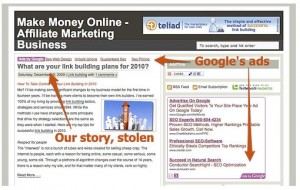
If I have time later, I’ll document the Byzantine process it takes to inform you of copyright infringement. Then after a week, you eventually ask for a lengthy DMCA request to be filled out.
I don’t have time to do one of these every five minutes that you allow someone to infringe my content without barrier on your service. Have some humanity. Use some common sense. Have someone actually look at what your told.
In about 30 seconds, you can generally tell the crap site reported for stealing is indeed a crap site you should remove. Shut them down under a terms of service violation rather than running for cover and helping no one on the DMCA route.
Now:
Reading what I wrote five years ago is pretty scary, because it all seems applicable today. In fact, I covered the same sorry situation just over a year ago, when I wrote Case Study: How Google Hosts & Funds A Copyright-Infringing Web Site. Someone on Blogger had taken one of our stories, and I found it a nightmare trying to figure that it was hosted on Blogger and then trying to report it.
Looking back at that more recent post, I see problems remain, such as:
- Some Blogger-hosted blogs still don’t have to have a standard nav bar with the “report abuse” link
- The “report spam blog” form still doesn’t ask for any details
I remain happy that the “Ads By Google” text with your ads does lead to an awesome policy violation reporting tool. But you continue to bury a link to this at the bottom of the “What Are Ads By Google” page, under you pushing AdWords and AdSense.
Enough. Seriously, enough. That page should primarily be designed to educate consumers. Any advertiser or publisher worth anything to you isn’t going to discover your ads through those “Ads By Google” links. Get the priorities on that page right.
#18
LOVE: Gmail’s “On Behalf Of” Problem Fixed!
Then

Your “Custom From” problem that I cover here is causing people to think they have to send now to both my “real” domain and my Gmail address….
Charge me if you have to, but fix it.
Now:
You fixed it! Thank you!
#19
N/A: Let Gmail Show More Than 100 Items
Then:

Now:
It still seems like this should be possible, but I’ve long since given up trying to review my spam items for false positives, as you do a great job. So I don’t need this so much, now.
#20
HATE: No Blacklists In Gmail
Then:
Let Gmail have customized blacklists. You do a good job catching spam, but you’re not perfect. I have no way of filtering out what you are missing, to help you get better. I explain more here. Work with Mailwasher, and I’ll especially think you rock.
Now:
I still can’t do this, short of creating a filter for particularly annoying spam. That works, but I wish I could push a button that did it.
I know you’ve got the “Report Spam” button, but that doesn’t immediately do anything. I want it to create a filter that I can see and for it to begin working from the moment I push it.
The button is also useless for those of us who still use Outlook — and yes, there are plenty of us.
#21
LOVE: Clickable Referrers In Google Analytics
Then:

In Google Analytics, I have to go to Referral Conversion, then see individual URLs rolled up under sites, then cut and paste things if I want to go to the page that sent me traffic. It could, and should, be much easier.
Now:
You added it in 2007, thanks!
#22
LOVE: An End To Overwhelmed Product Launches
Then:
Stop opening products to everyone, then getting overwhelmed. The story is getting tiring. Everyone’s invited to use Google Web Accelerator, then you pull it down. Come get Google Analytics, then you shut it down to newcomers to demand. Come get Google Page Creator, then it closes….
You know whatever you roll out is going to get overwhelmed. Figure out another way to open it up. The demand is no longer making it seem like your products are hot. It’s making it seem like you are lame and can’t anticipate or handle the rush.
Now:
It’s been ages since I recall this being an issue, so thanks for fixing it!
#23
LOVE: That You Charge For Products
Then:
Charge for things! Seriously, I’m getting frightened. I love that anyone can get free analytics, email, you name it from you. But I’m fearful that people also can’t get support for when things go wrong. I think this guy’s still trying to get an official response on what happened to his lost Gmail account.
Meanwhile, I worry that companies I want competing with you, to keep you on your toes, can’t do so when you use advertising to underwrite everything. It just feels anti-competitive. Plus, aren’t you kind of sick of shoving ads at us everywhere? Don’t I have enough ads on the floor of my supermarket already? Can’t part of Google’s mission be to help reduce advertising in places where I don’t need it?
Now:
When I ran out of space with Gmail, a credit card got me more — and solved a number of other issues. I gladly paid it. And I’ll gladly pay for other essential services, if you’ll improve them, too.
#24
MIXED: It’s About Search, Not Selling
Then:
Remember it’s not about selling. Google Video started with searchable TV content. That got dropped when the new video sales began. OK, the official line is that you’re working with providers about bringing back the TV content. The unspoken truth is you can’t cut those deals to sell TV entertainment shows without dropping the taping. But do work on ways to bring it back.
Yes, there’s a reason why video search is closely related to video shopping. But being able to keyword search across things like news shows or popular references in entertainment content was informational.
And that’s your mission, right? Organize the world’s information, not just sell TV shows. Similarly, as you begin to sell books or build out the Google Base content, don’t just become an Amazon or eBay alternative.
Now:
It’s weird reading what I wrote above, given that Google Video abandoned hosting and selling video content. YouTube has taken over. But perhaps that was a harbinger of the careful line you walk now.
Is Google Books a store for buying books or a guide to books everywhere? If the former, you risk enraging the “search neutrality” folks who claim you’re favoring yourself.
Similarly, what will happen as you bring more paid content into YouTube? Will Google Video, which covers video content from around the web, favor YouTube rentals? Will the TV search feature within Google TV favor TV content on YouTube?
When the cloud-based Google music selling service finally arrives, people are going to weigh that against iTunes and Amazon. Do you list them as part of your search mission?
One challenge is that if you don’t become involved in some of these areas — sales of movies, music, and other content — you risk being a weaker competitor to Apple, and everyone risks there being no counterbalance to the Apple iTunes / iOS ecosystem.
Another challenge is that if you don’t build some of these destinations, as happened with YouTube and Google Books, there’s little content to ultimately search.
Still, Clicker managed to produce a great guide to TV content without hosting a thing. That’s what a search engine was supposed to do, be a trustworthy neutral party pointing to the best everywhere. Sure, monetize those links to trusted providers, but that’s different than being a provider yourself.
#25
HATE: Fix The Philosophy
Then:

As for “you can make money without doing evil,” you know that’s not so when you yourselves created an evil scale to decide just how bad bowing to Chinese censorship would be for you.
Give us a realistic philosophy, one that doesn’t give you so far to fall from lofty heights. We’ll like you more for it, rather than the excuses and spin when you can’t do what you say you should do.
Now:
Your philosophy page was last updated in September 2009. Some of those updates failed to reflect reality then, and the page is even more outdated now. Some comments:
“Focus on the user and all else will follow.”
I know you believe in this. I’m glad you believe in it. I also believe if often does guide many of your decisions.
But identifying “Get Rich Quick” ads and still allowing them to run isn’t focusing on the user.
Pushing that we don’t need net neutrality in the mobile broadband space, I’m sorry — I still don’t see that as working for the user.
Not finding a way to work with Facebook apparently because using Facebook Connect might give Facebook too much visibility into your system? That’s working in your own interest, not the users.
Don’t get me wrong. I think you DO believe not working with Facebook is in the users’ interest. The problem is you get into a mindset where you believe that Google knows best for the user. Google doesn’t always know best.
And also don’t get me wrong — in the whole Facebook dispute, there are heaps of issues I have with Facebook. But Facebook never has seemed to make much pretension of working in anything but Facebook’s own interest. They didn’t set a high standard that they fail to meet. I’m glad you have those pretensions, but maybe they need to be more realistic.
“It’s best to do one thing really, really well”
You left doing “one thing really well” behind so many years ago that it’s embarrassing to still be staying this.
“Democracy on the web works”
Except it doesn’t, because then you wouldn’t have to fight things like people buying links, nor have to roll out new changes to stop low-quality content from getting top rankings or algorithms to catch bad merchants. Indeed, since your results have been more and more personalized, there’s arguably less “democracy” in them. That’s not necessarily bad — but the philosophy page doesn’t reflect reality.
“You can make money without doing evil.”
This isn’t 2001, and you can’t claim — as you do on the philosophy page — that not being evil is proven by avoiding pop-ups or “flashy” ads.
You understand that you have advertisers running “Get Rich Quick” ads but don’t stop those? That’s kind of evil, don’t you think?
Telling your publishers, as you do, to put more ads on their pages — you don’t think that interferes with reading like those pop-ups you’re so worried about? And have you seen a typical Made-For-AdSense web site, where the actual “content” is often tiny, surrounded in a fog of your ads? That’s not kind of evil?
The famed “Don’t Be Evil” mantra doesn’t actually appear on your philosophy page (instead, it’s in the corporate code of conduct). But the philosophy page talks about not “doing evil,” and that still rings to my ear as if Google assumes that everyone else is evil.
How About, “Aim For Good?”
Everyone else isn’t evil, and no one likes that being implied. I really appreciate that Google has lofty goals, but how about flipping things around. “Be good.” Or even, “Aim for good.” You’re not always going to hit that goal, but it’s easier to forgive imperfections in those who already seemingly admit to them.
Scorecard!
50/50
Still reading? Good for you! Just scrolled down to the end? I understand. I’ve gone deep for those who want background, but here’s the summary, grouped by Hate, Love, Like, Mixed and N/A:
Hate
- Web Search Counts That Make No Sense
- Google Keeps Serving Up Sites You’ve Seen
- You Cache Pages
- No Guaranteed Web Search Support
- No Pick & Choose For Search Advertisers
- AdWords & AdSense Confusion
- Search Revenues Aren’t Broken Out
- Self-Serve AdSense
- Reporting Copyright Infringement On Blogger
- No Blacklists In Gmail
- Fix The Philosophy
Love
- Related Searches Everywhere
- Easier Access To All Your Tools
- RSS For Web Search
- Support For NOODP
- Gmail’s “On Behalf Of” Problem Fixed!
- Clickable Referrers In Google Analytics
- An End To Overwhelmed Product Launches
- That You Charge For Products
Like
- Less User Interface Confusion
- Country-Specific Results On Google.com
- More Responsive To Click Fraud Complaints
Mixed
- It’s About Search, Not Selling
N/A
- Blogger Being Free
- Let Gmail Show More Than 100 Items
That’s only 11 “Hates” left out of an original 25, so call it a 56% “success” rate on fixing things. However, of the 14 “fixed” items, two became non-issues and on one, I have mixed feelings. So for “success,” I’m counting all the things marked “Love” and “Like” — 11 in total. That makes it even, in my books — 50% of the things I hoped to have fixed were. And I’m pretty happy about that.
Here’s hoping that fixing the other half won’t take a further five years. And for a wishlist looking forward, I’d love to see Google do things like provide more accurate date-based searching across all of its properties (dates can be and are a mess), and ombudsman to look at issues raised with Google and for Gmail to pretty-please let me toggle conversation view on and off without having to dig into my settings. If Outlook 2010 can do it, I’m sure Gmail can.
And hey, if you liked this story — “Like” it on Facebook with the button below, share it on Twitter with the Tweet button, Buzz it on Google — you know the drill!
Contributing authors are invited to create content for Search Engine Land and are chosen for their expertise and contribution to the search community. Our contributors work under the oversight of the editorial staff and contributions are checked for quality and relevance to our readers. The opinions they express are their own.
Related stories
New on Search Engine Land

